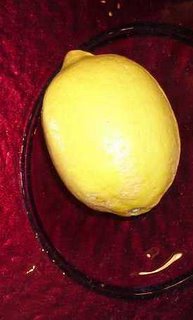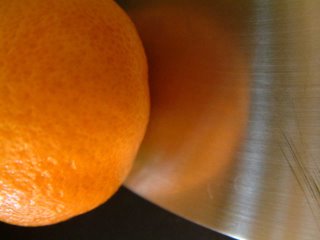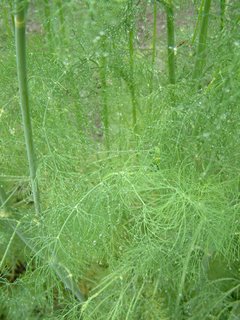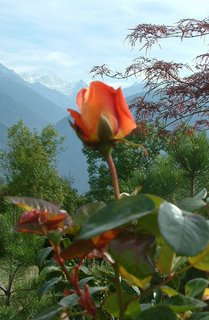You are the orange of my eye

At 3 a.m., with my daughter unwell and still not asleep I found myself murmuring "Bean, Bean," to console her. It worked: she went to sleep. But I suddenly lay wide awake, wondering why I call my daughter a vegetable. And why beans, which I like, but they run a poor second to (frozen) peas. Sometimes I call her Pumpkin, which is not a very positive image if you remember their role in Cinderella.
I thought of all the other fruit and vegetable children I know. My first-born was occasionally called Peanut, a pulse rather than a vegetable, but part of the garden crop. I have no idea how or why we started that; we are sure it had nothing to do with Charles Schultz's comic strip. It stopped when Liam went to school and made it clear that his first name was a poor choice on our part, but it sure beat being called Peanut in public.
Peanut was all the worse because of its French equivalent, "cacahuete", the first two syllables of which are beloved by all naughty little boys in French. Ca-ca is gleefully shouted from the time children are toilet-trained until the moment they realize their mothers are bigger and stronger than they are, and mother means it when she says you will not say that word!
As I lay in the dark with snuffle-snuffle sounds from my daughter, next to me, I ran a rollcall of family nicknames. My sister called her son Peanut, so groundnuts apparently send out runners in our family. My husband's brother called his daughter Bean, which we didn't know until we had been calling ours that for a while. And he calls his wife Pud', rhymes with good, which you have to be English to get your brain around (Pud' as in pudding, as in after-dinner sweets akin to dessert). Same as calling her Honey, in a way, but perhaps less cloying.
 Music encourages us. "You are the apple of my eye . . ." Try putting a lemon there. Or an orange.
Music encourages us. "You are the apple of my eye . . ." Try putting a lemon there. Or an orange.
I was called Onion-top when I was little. I like to think it had to do with one of those cute little ribbon and spout hairdos people give girls when you can still count the hairs on their heads. My sister says the name has more sinister origins, and, four years older, she was at an age to know.
Lyle, the boy in my second-grade class who had a glass eye, sported red hair. He was the most interesting person in the class because he could pop his eye out, and he was, of course, called Carrot.
For a long time I thought the great American radio raconteur and interviewer was called Spuds Terkel and I wondered why he was called Potato for short. He undoubtedly had a mealy face. Spuds was better than Tatty for a nickname, for sure. I was astonished to see his name in print when I was an adult and to realize I had misheard it all those years and imagined him to be a vegetable person.
The French routinely refer to their children as cabbages. "Il est chou!" they coo at lovely babies. No one seems to mind the lack of elegance: so much for cliches about the French. I have a friend who calls her daughter Ciboulette, or Chives, which I suppose is close to the cabbage family in smell and taste, if not in pure biological terms. Why do we give our children these labels, meant to be endearing and possibly earthy? What throwback to nature brings out this need in adults? Children name their dolls and cuddly creatures all kinds of things, but I have yet to meet a warm cuddly with a vegetable name.
Why do we give our children these labels, meant to be endearing and possibly earthy? What throwback to nature brings out this need in adults? Children name their dolls and cuddly creatures all kinds of things, but I have yet to meet a warm cuddly with a vegetable name.
At a low point in my life, when the other half of a failed relationship moved in with a Mother Earth neighbor who named her just-born daughter Meadow, I lashed out at the cuteness of new parents. I sent them a list of suggestions for other garden baby names in case the need arose. These ranged from Celery, which had the almost authentic ring of a saint the Catholic church renounced, to Prune Pit, which meant they could avoid the trauma of finding a suitable middle name. Some veggies were clearly out: Leek could be misunderstood for a baby's name, and Garlic would bring on the bullies in no time. But Avocado has a nice quasi-Latino sound and Tomato would quickly shorten toTommy. Fennel sounds Scandinavian. If Corn sat with a plonk, Maize is close to Maisie and I've known happy women named that, as well as others called Pepper. My suspicion is that most species, once they reach adulthood, long for something finer and better that they think they see in other creatures. This would explain why roses so often name their children after people, a leap of blind faith that I think is undeserved.
My suspicion is that most species, once they reach adulthood, long for something finer and better that they think they see in other creatures. This would explain why roses so often name their children after people, a leap of blind faith that I think is undeserved.
I have a magnificent Louis de Funès in my garden, tall and deep peach to pale apricot in tone, with a wonderful perfume. I call it a rose, but it prefers the Louis label.
Gertrude Stein once said that, thanks to repetition in that famous rose line of hers (this is a quiz: what is the line?) the rose was red in English literature for the first time in 100 years. So perhaps orange Louie has a point. He is definitely not just a rose.



1 Comments:
A most enjoyable read! Prune Pit. Hmmm. Cute name, but will never catch on...
Post a Comment
<< Home